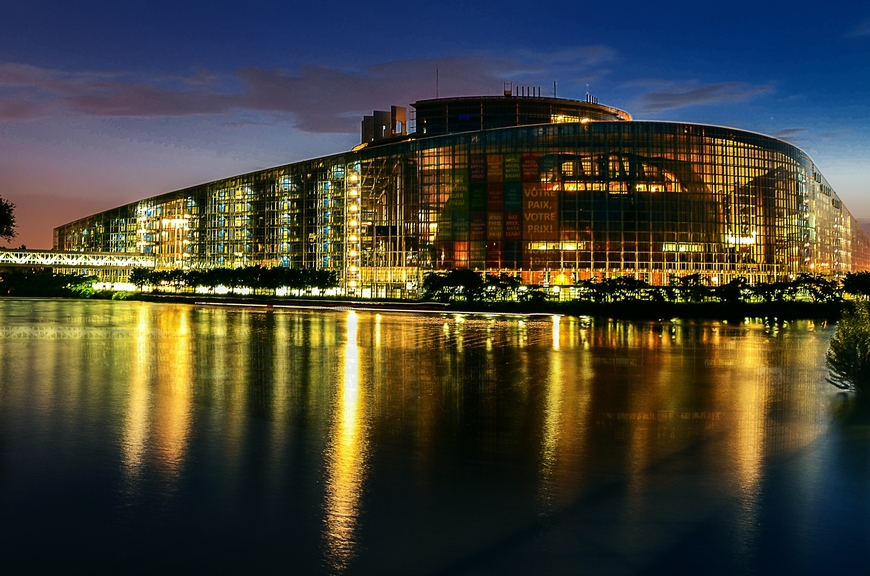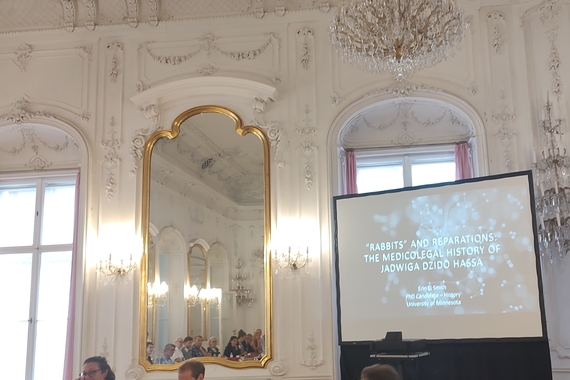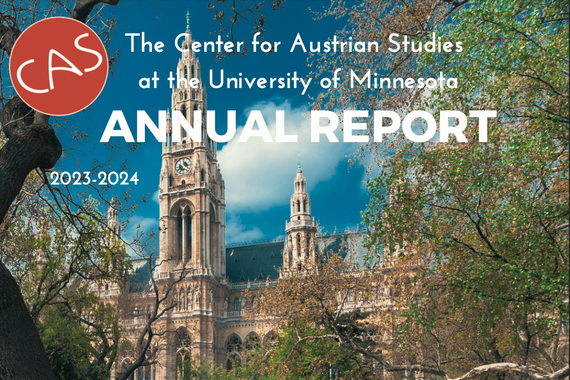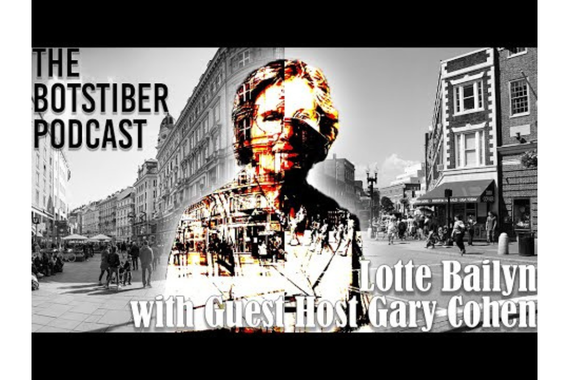An Austrian Literary Interpretation of the European Union: Robert Menasse’s Die Hauptstadt (2017)
An Austrian Literary Interpretation of the European Union: Robert Menasse’s Die Hauptstadt (2017)
By Catherine Guisan, University of Minnesota
How to make the European Union (EU) “interesting”? This is a problem scholars, politicians and bureaucrats have wrestled with for decades. “You do not fall in love with a market,” former French EU leader Jacques Delors once quipped. Yet for Robert Menasse, the Austrian fiction writer and literature theorist, whose book Die Haupststadt (The Capital) obtained the 2017 German Book Prize, there is much to love and to satirize in Brussels.[1] Menasse’s favorite literary genre are “evening before” novels, which represent the “eve of an epochal rupture.” The Greek crisis and the harsh response of the German-dominated European Council (EU’s heads of governments) prompted Menasse to plan an ambitious new novel, centered around the European Commission’s civil servants. In 2010 he moved to Brussels to do research; two years later, instead of the novel, he published an essay, Der Europäische Landbote, which obtained the European Book Prize.[2]
In this first book and the many interviews and panel discussions that followed, Menasse advocates rather iconoclastically for a Europe of regions where nation-states and the nationalistic European Council will be abolished once and for all. Not only the financial crisis, during which national interests trumped the European ethos of shared interests, but Menasse's Austrian origins also taught him to mistrust the nation-state. Indeed, how to build an Austrian nation when “the generation that established the second Austrian Republic in 1945, already lived in four different Austrias with four different political systems, and four different identities within shifting terrritorial borders?” He mocks the abolute majority of Austrians who responded in a poll (undated in his book) that they constitute a “cultural nation” because of Austria’s “beautiful landscape.” For Menasse, what links Europeans are “mentalities,” certain ways of being in the world, which are not necessarily related to national identity. Thus, living in Vienna, he feels much closer “in mentality” to Bratislava, Slovakia or Sopron, Hungary than to Budenz or Klagerfut in the Western part of Austria, except for a common stake in dignified living, which links all human beings.[3]
How to make of all this an interesting novel? Full disclosure: I read Menasse’s Die Hauptstadt in the French translation, and therefore cannot comment on the German literary style, which many critics have praised. Menasse’s zany and sarcastic imagination shines through Die Hauptstadt, which is teeming with interesting characters introduced at a breakneck pace. The reader meets Mateusz Oswiecki, a mysterious Polish murderer, and Austrian Martin Susman who works for the underfinanced DG (direction générale) at Education and Culture. Susman’s boss is Fenia Xenopoulou, an ambitious careerist from Cyprus, who never reads a book, except for the favorite novel of the Commission president who, she hopes, will transfer her to a more glamorous DG. Susman, Xenopoulou and other colleagues come up with the idea of a “Big Jubilee Project” around the theme of “Auschwitz” to mark the 50th anniversary of the Commission. Indeed, the victims represent many identities, ethnicities and religions: and only Auschwitz and its pact of “never again” made the unification of Europe possible. Thus the Project will demonstrate how necessary, even “sexy,” the supranational Commission was from day one, and place survivors at the center of the celebration. But where to find them? Most are dead, and relevant statistics lacking. One is found at last, David De Vriend, a former Jewish resistant and high school teacher, who has moved to a nursing home, which he hates. Tragically he dies in a bomb explosion in the Brussels subway’s Maelbeek station, close to the EU institutions, in the last pages of the book. He got there in a fog, jumping from a city bus just as he remembered jumping from the train taking his family to Auschwitz many years earlier. Meanwhile, a senior Commission official, the smooth talking Italian nobleman Romolo Strozzi manages to sink the Jubilee Project by appealing to his Hungarian colleague Attila Hidegkuti of the European Council. Cabinet ministers are easily convinced that the Jubilee is politically inopportune. Their main concern? The Project would involve anti-nationalist testimonies, a threat to the nation-state.
Although Menasse made a good case in his first book on the EU for the “frugal,” “rational,” “highly qualified,” and even “funny” Commission bureaucrats he met in Brussels, The Hauptstadt leaves the reader somewhat down-hearted, and not only because of De Vriend’s sad fate, and so much work sunk in a dubious project. Bureaucrats from more prestigious Commission DGs, beside Culture, make brief appearances, such as German Kai-Uwe Frigge from Trade, Maurice Géronnez from Economic and Financial Affairs, and Englishman George Morland from Agriculture. However, most characters are quite unlikable, without significant personal attachments, and lonely. One breathes a sigh of relief in encountering Émile Brunfaut, the Belgian Police Inspector thwarted in his attempt to inquire into Matteusz’ crime. He confides in his close friend and colleague, Philippe Gaultier, who helps him pursue his investigation; and he delights in Philippe’s daughter and his goddaughter, eight-year old Joëlle and the only child in the book. Martin Susman shows also unexpected dedication in rescuing his brother Florian Susman, the president of the European Association of pork producers, from a grave car accident. When asked about his small-minded and cynical protagonists, Menasse responded that his view of the Commission had not changed, but people are “depressed” because they had to relinquish “control” to the European Council and national governments in the last decade, and the novel reflects this.[4]
It is true that there is little love lost between EU institutions. Some argue, contrary to Menasse, that the European Council and the General Affairs Council are the institutions truly defending the shared European interest.[5] One senior adviser to the Council compared, off the record, the Commission to a “gigantic aid organization;” meanwhile the assistant of a European Parliament Vice-President could not say where the Council building was (ten minutes walk from the European Parliament). [6] Infighting and mutual contempt among bureaucracies is nothing new, and Die Hauptstadt constitutes a brilliant satire of this phenomenon. One wonders, however, why the advocate of an EU based on regions makes no mention of the European Committee of Regions. Did Menasse ever visit this modest but lively institution whose 350 members represent local and regional entities?
Earlier this year, a heated controversy erupted over Die Hauptstadt in the German-speaking press. Should Menasse be rewarded with the Rhineland-Palatinate’s Carl-Zuckmayer Medal for “his service to the German language and cultural life” when he maintains, quite inaccurately, in his essay, novel and public appearances that the European Union was founded on the memory of the Holocaust, and that the first Commission president Walter Hallstein made his first official speech in Auschwitz in 1958? Menasse got the medal on January 8, 2019; but many have critiqued him for what they call his “lies,” an unacceptable way to “cheapen” Auschwitz. Also Menasse, by arguing wrongly that Hallstein stood for the abolition of nations, provides fodder for anti-EU arguments in defense of the nation-state. Who needs such a “false friend?”[7] It is true that after the end of the Cold War, there was an attempt to make of the Holocaust the founding memory of the European Union; the idea eventually was set aside, in part because no political society can develop solely on the memorial ground of atrocities.[8] After 67 years of European integration EU citizens could remember a few accomplishments as well; but this is not Die Hauptstadt’s argument. The EU is a huge political society in becoming. At the least, Menasse has made an original and witty contribution to the necessary public debate about its flaws and merits.
Endnotes
[1] Die Hauptstadt (Berlin: Suhrkamp Verlag, 2017). English translation forthcoming in 2019.
[2] Robert Menasse, Der Europäische Landbote: Die Wut der Bürger und der Friede Europas oder Warum die geschenkte Demokratie einer erkämpften weichen muss (Vienna: Paul Zsolnay Verlag, 2012). Citations from Enraged Citizens, European Peace and Democratic Deficits: Or Why the Democracy Given to Us Must Become One We Fight For, trans. Craig Decker (London, New York, Calcutta: Seagull Books, 2016), p. 110.
[3] Menasse 2016, pp. 64-66 and 86.
[4] Konstantin Richter, “The First Great EU Novel”, Politico, October 15, 2017. https://www.politico.eu/article/robert-menasse-first-great-eu-novel/ (accessed February 25, 2019).
[5] Robert Cooper, The Breaking of Nations: Order and Chaos in the Twenty-First Century (New York: Atlantic Monthly Press, 2003); Luuk Van Middelaar, The Passage to Europe: How a Continent Became a Union, trans. Liz Waters (New Haven and London: Yale University Press, 2013).
[6] Comments to the author, Brussels, December 2008.
[7] http://www.spiegel.de/spiegel/heinrich-august-winkler-ueber-robert-menasse-europas-falsche-freunde-a-1174045.html.
[8] Aline Sierp, History, Memory, and Trans-European Identity: Unifying Divisions (New York and Abingdon, UK: Routledge, 2014), pp. 120-152.



